Lorenzo Pellegrini
Detecting Localized Deepfakes: How Well Do Synthetic Image Detectors Handle Inpainting?
Dec 18, 2025

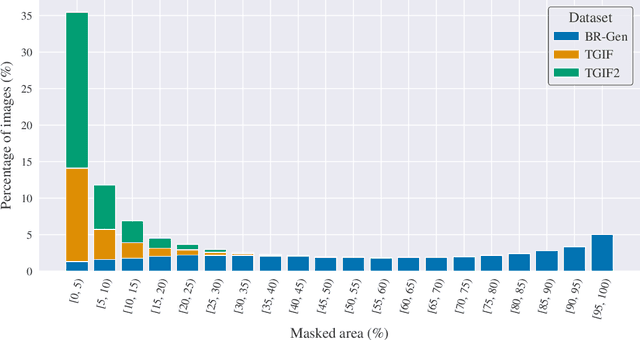
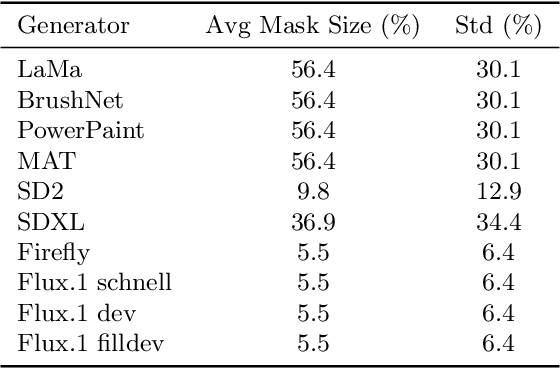
Abstract:The rapid progress of generative AI has enabled highly realistic image manipulations, including inpainting and region-level editing. These approaches preserve most of the original visual context and are increasingly exploited in cybersecurity-relevant threat scenarios. While numerous detectors have been proposed for identifying fully synthetic images, their ability to generalize to localized manipulations remains insufficiently characterized. This work presents a systematic evaluation of state-of-the-art detectors, originally trained for the deepfake detection on fully synthetic images, when applied to a distinct challenge: localized inpainting detection. The study leverages multiple datasets spanning diverse generators, mask sizes, and inpainting techniques. Our experiments show that models trained on a large set of generators exhibit partial transferability to inpainting-based edits and can reliably detect medium- and large-area manipulations or regeneration-style inpainting, outperforming many existing ad hoc detection approaches.
AI-GenBench: A New Ongoing Benchmark for AI-Generated Image Detection
Apr 29, 2025



Abstract:The rapid advancement of generative AI has revolutionized image creation, enabling high-quality synthesis from text prompts while raising critical challenges for media authenticity. We present Ai-GenBench, a novel benchmark designed to address the urgent need for robust detection of AI-generated images in real-world scenarios. Unlike existing solutions that evaluate models on static datasets, Ai-GenBench introduces a temporal evaluation framework where detection methods are incrementally trained on synthetic images, historically ordered by their generative models, to test their ability to generalize to new generative models, such as the transition from GANs to diffusion models. Our benchmark focuses on high-quality, diverse visual content and overcomes key limitations of current approaches, including arbitrary dataset splits, unfair comparisons, and excessive computational demands. Ai-GenBench provides a comprehensive dataset, a standardized evaluation protocol, and accessible tools for both researchers and non-experts (e.g., journalists, fact-checkers), ensuring reproducibility while maintaining practical training requirements. By establishing clear evaluation rules and controlled augmentation strategies, Ai-GenBench enables meaningful comparison of detection methods and scalable solutions. Code and data are publicly available to ensure reproducibility and to support the development of robust forensic detectors to keep pace with the rise of new synthetic generators.
FRCSyn Challenge at WACV 2024:Face Recognition Challenge in the Era of Synthetic Data
Nov 17, 2023



Abstract:Despite the widespread adoption of face recognition technology around the world, and its remarkable performance on current benchmarks, there are still several challenges that must be covered in more detail. This paper offers an overview of the Face Recognition Challenge in the Era of Synthetic Data (FRCSyn) organized at WACV 2024. This is the first international challenge aiming to explore the use of synthetic data in face recognition to address existing limitations in the technology. Specifically, the FRCSyn Challenge targets concerns related to data privacy issues, demographic biases, generalization to unseen scenarios, and performance limitations in challenging scenarios, including significant age disparities between enrollment and testing, pose variations, and occlusions. The results achieved in the FRCSyn Challenge, together with the proposed benchmark, contribute significantly to the application of synthetic data to improve face recognition technology.
Detecting Morphing Attacks via Continual Incremental Training
Jul 27, 2023



Abstract:Scenarios in which restrictions in data transfer and storage limit the possibility to compose a single dataset -- also exploiting different data sources -- to perform a batch-based training procedure, make the development of robust models particularly challenging. We hypothesize that the recent Continual Learning (CL) paradigm may represent an effective solution to enable incremental training, even through multiple sites. Indeed, a basic assumption of CL is that once a model has been trained, old data can no longer be used in successive training iterations and in principle can be deleted. Therefore, in this paper, we investigate the performance of different Continual Learning methods in this scenario, simulating a learning model that is updated every time a new chunk of data, even of variable size, is available. Experimental results reveal that a particular CL method, namely Learning without Forgetting (LwF), is one of the best-performing algorithms. Then, we investigate its usage and parametrization in Morphing Attack Detection and Object Classification tasks, specifically with respect to the amount of new training data that became available.
Avalanche: A PyTorch Library for Deep Continual Learning
Feb 02, 2023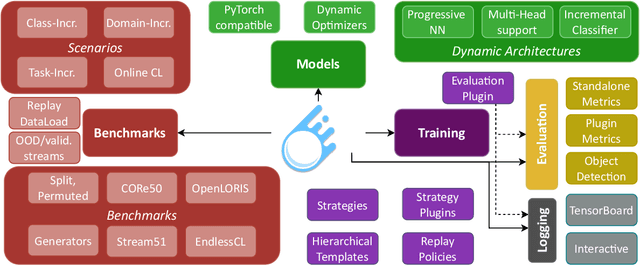
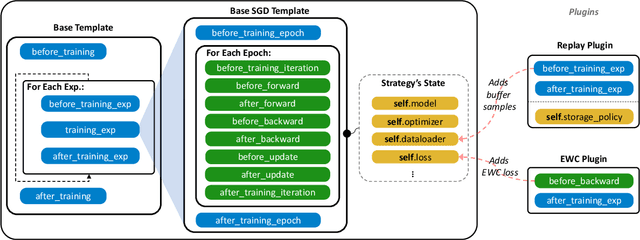
Abstract:Continual learning is the problem of learning from a nonstationary stream of data, a fundamental issue for sustainable and efficient training of deep neural networks over time. Unfortunately, deep learning libraries only provide primitives for offline training, assuming that model's architecture and data are fixed. Avalanche is an open source library maintained by the ContinualAI non-profit organization that extends PyTorch by providing first-class support for dynamic architectures, streams of datasets, and incremental training and evaluation methods. Avalanche provides a large set of predefined benchmarks and training algorithms and it is easy to extend and modular while supporting a wide range of continual learning scenarios. Documentation is available at \url{https://avalanche.continualai.org}.
Class-Incremental Learning with Repetition
Jan 26, 2023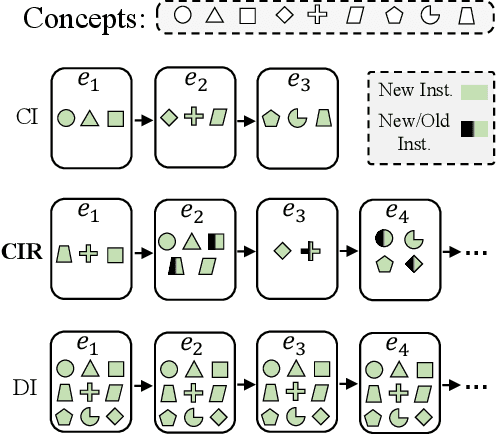

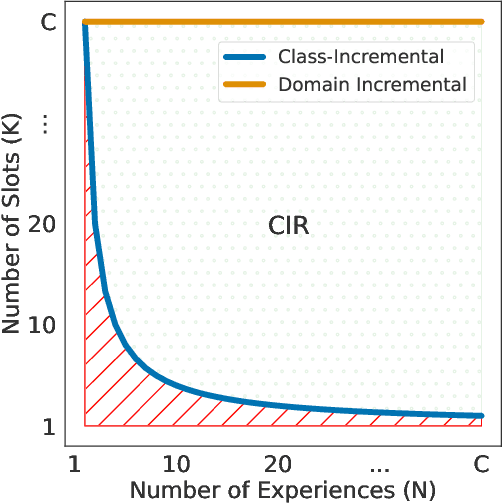
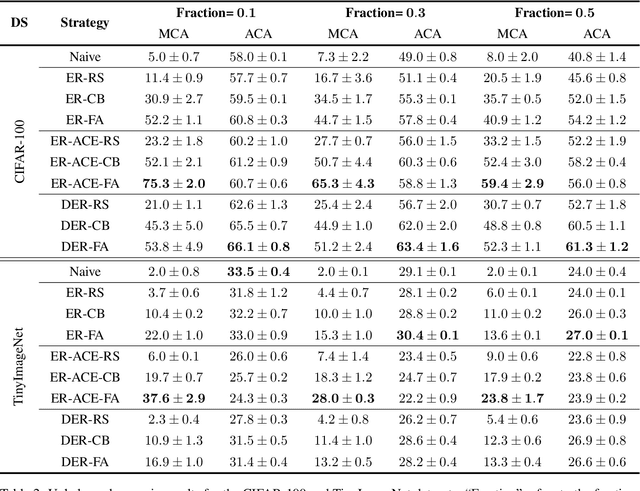
Abstract:Real-world data streams naturally include the repetition of previous concepts. From a Continual Learning (CL) perspective, repetition is a property of the environment and, unlike replay, cannot be controlled by the user. Nowadays, Class-Incremental scenarios represent the leading test-bed for assessing and comparing CL strategies. This family of scenarios is very easy to use, but it never allows revisiting previously seen classes, thus completely disregarding the role of repetition. We focus on the family of Class-Incremental with Repetition (CIR) scenarios, where repetition is embedded in the definition of the stream. We propose two stochastic scenario generators that produce a wide range of CIR scenarios starting from a single dataset and a few control parameters. We conduct the first comprehensive evaluation of repetition in CL by studying the behavior of existing CL strategies under different CIR scenarios. We then present a novel replay strategy that exploits repetition and counteracts the natural imbalance present in the stream. On both CIFAR100 and TinyImageNet, our strategy outperforms other replay approaches, which are not designed for environments with repetition.
Architect, Regularize and Replay (ARR): a Flexible Hybrid Approach for Continual Learning
Jan 06, 2023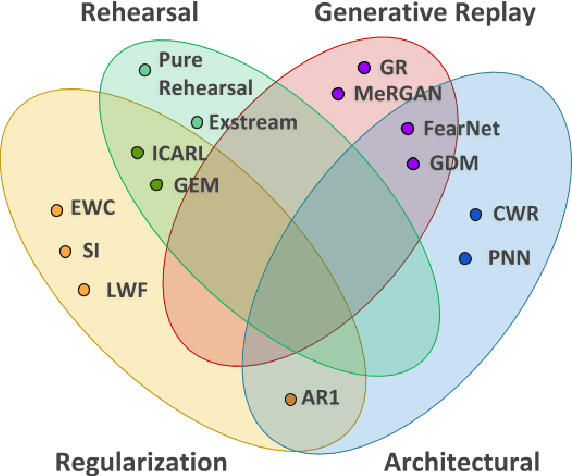
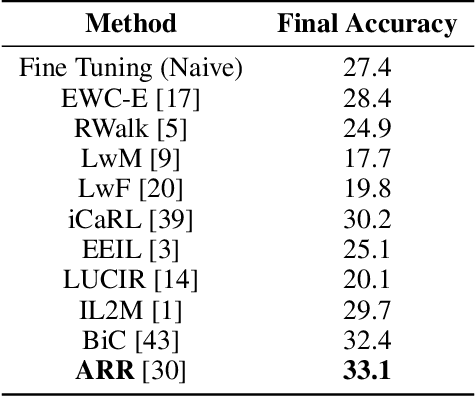
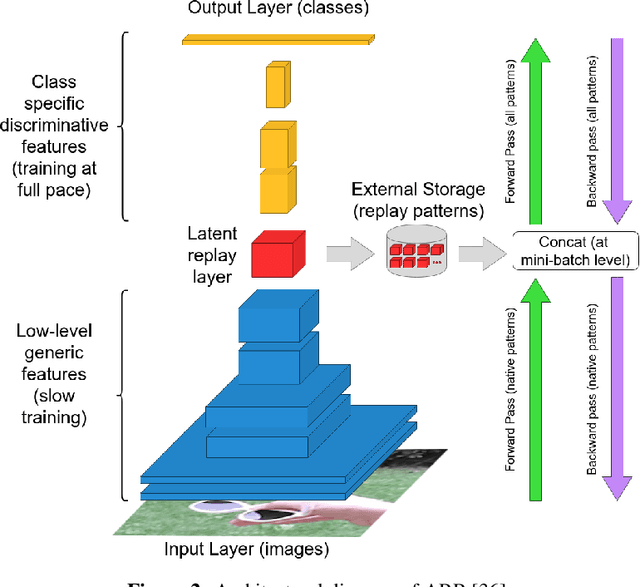
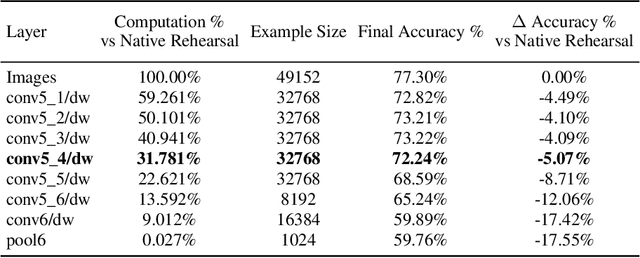
Abstract:In recent years we have witnessed a renewed interest in machine learning methodologies, especially for deep representation learning, that could overcome basic i.i.d. assumptions and tackle non-stationary environments subject to various distributional shifts or sample selection biases. Within this context, several computational approaches based on architectural priors, regularizers and replay policies have been proposed with different degrees of success depending on the specific scenario in which they were developed and assessed. However, designing comprehensive hybrid solutions that can flexibly and generally be applied with tunable efficiency-effectiveness trade-offs still seems a distant goal. In this paper, we propose "Architect, Regularize and Replay" (ARR), an hybrid generalization of the renowned AR1 algorithm and its variants, that can achieve state-of-the-art results in classic scenarios (e.g. class-incremental learning) but also generalize to arbitrary data streams generated from real-world datasets such as CIFAR-100, CORe50 and ImageNet-1000.
3rd Continual Learning Workshop Challenge on Egocentric Category and Instance Level Object Understanding
Dec 13, 2022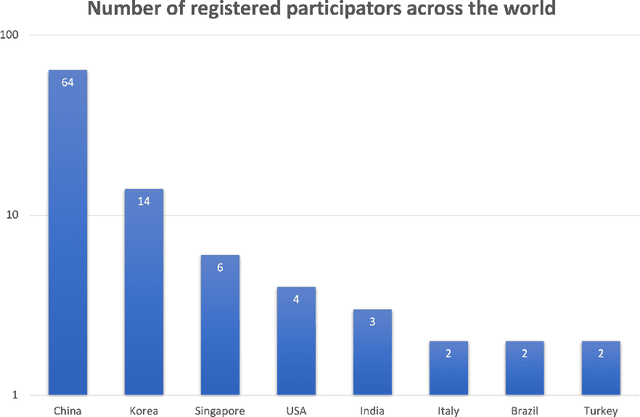



Abstract:Continual Learning, also known as Lifelong or Incremental Learning, has recently gained renewed interest among the Artificial Intelligence research community. Recent research efforts have quickly led to the design of novel algorithms able to reduce the impact of the catastrophic forgetting phenomenon in deep neural networks. Due to this surge of interest in the field, many competitions have been held in recent years, as they are an excellent opportunity to stimulate research in promising directions. This paper summarizes the ideas, design choices, rules, and results of the challenge held at the 3rd Continual Learning in Computer Vision (CLVision) Workshop at CVPR 2022. The focus of this competition is the complex continual object detection task, which is still underexplored in literature compared to classification tasks. The challenge is based on the challenge version of the novel EgoObjects dataset, a large-scale egocentric object dataset explicitly designed to benchmark continual learning algorithms for egocentric category-/instance-level object understanding, which covers more than 1k unique main objects and 250+ categories in around 100k video frames.
Generative Negative Replay for Continual Learning
Apr 12, 2022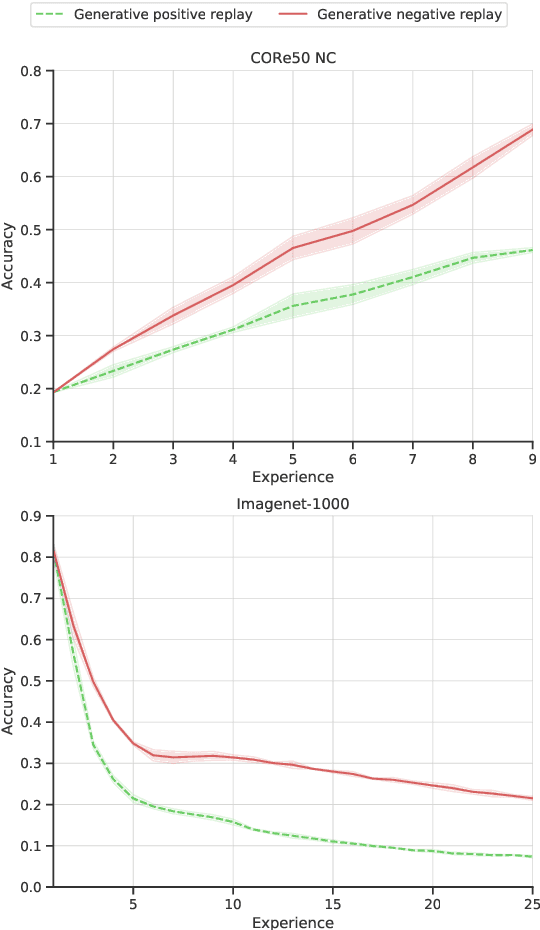
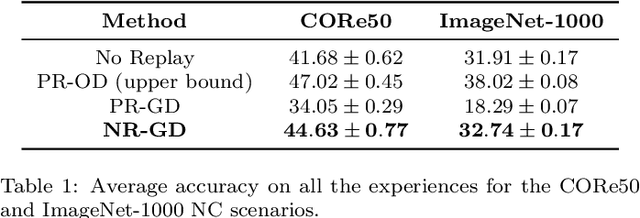

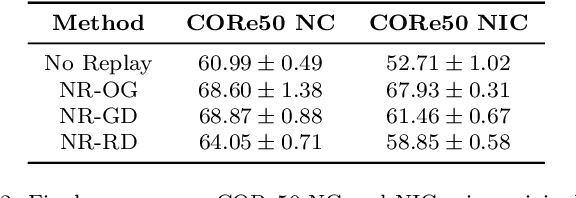
Abstract:Learning continually is a key aspect of intelligence and a necessary ability to solve many real-life problems. One of the most effective strategies to control catastrophic forgetting, the Achilles' heel of continual learning, is storing part of the old data and replaying them interleaved with new experiences (also known as the replay approach). Generative replay, which is using generative models to provide replay patterns on demand, is particularly intriguing, however, it was shown to be effective mainly under simplified assumptions, such as simple scenarios and low-dimensional data. In this paper, we show that, while the generated data are usually not able to improve the classification accuracy for the old classes, they can be effective as negative examples (or antagonists) to better learn the new classes, especially when the learning experiences are small and contain examples of just one or few classes. The proposed approach is validated on complex class-incremental and data-incremental continual learning scenarios (CORe50 and ImageNet-1000) composed of high-dimensional data and a large number of training experiences: a setup where existing generative replay approaches usually fail.
Is Class-Incremental Enough for Continual Learning?
Dec 06, 2021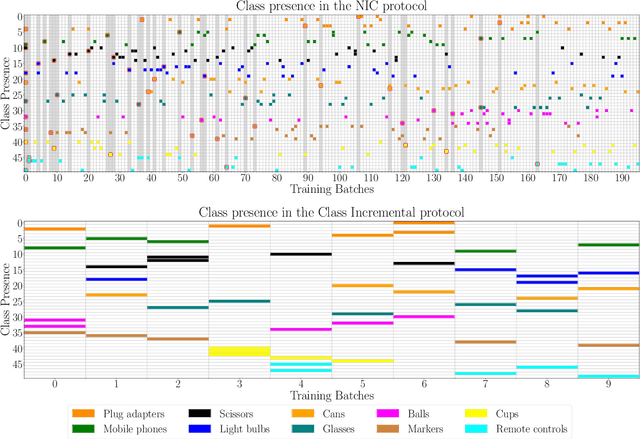
Abstract:The ability of a model to learn continually can be empirically assessed in different continual learning scenarios. Each scenario defines the constraints and the opportunities of the learning environment. Here, we challenge the current trend in the continual learning literature to experiment mainly on class-incremental scenarios, where classes present in one experience are never revisited. We posit that an excessive focus on this setting may be limiting for future research on continual learning, since class-incremental scenarios artificially exacerbate catastrophic forgetting, at the expense of other important objectives like forward transfer and computational efficiency. In many real-world environments, in fact, repetition of previously encountered concepts occurs naturally and contributes to softening the disruption of previous knowledge. We advocate for a more in-depth study of alternative continual learning scenarios, in which repetition is integrated by design in the stream of incoming information. Starting from already existing proposals, we describe the advantages such class-incremental with repetition scenarios could offer for a more comprehensive assessment of continual learning models.
 Add to Chrome
Add to Chrome Add to Firefox
Add to Firefox Add to Edge
Add to Edge